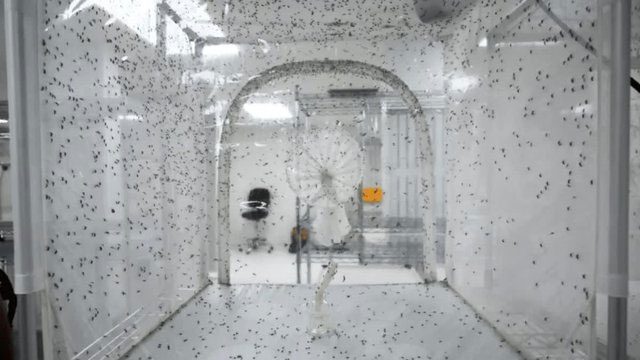In selected areas where male mosquitoes are released, researchers from Singapore have observed a significant decline in the population of Aedes aegypti mosquitoes in the wild, along with a noteworthy decrease in dengue virus infections.
Tens of millions of pathogen-carrying mosquitoes are being bred by the National Environment Agency (NEA) of Singapore in plastic containers to combat dengue fever.
Although the “using poison to fight poison” method has been implemented in various countries worldwide for the past decade, the NEA researchers’ project has garnered attention for its application of automation and AI technology to enhance mass mosquito breeding.
According to Undark, all mosquitoes bred at NEA are Aedes aegypti. This species can transmit viruses such as dengue fever to humans. The Centers for Disease Control and Prevention (CDC) estimates that up to 400 million people are infected with the dengue virus each year, with approximately 40,000 fatalities resulting from severe dengue.

A cage filled with male and female mosquitoes carrying Wolbachia bacteria mating. (Photo: ROSLAN RAHMAN / Getty)
However, the mosquitoes bred by the NEA do not carry any pathogens. They have been exposed to a type of bacteria named Wolbachia, which will be transmitted to the next generation of mosquitoes in an effort to prevent the spread of this dangerous virus.
Specifically, Aedes aegypti mosquitoes become less capable of transmitting the dengue virus to humans when infected with Wolbachia bacteria. Moreover, in rare cases, this bacteria can prevent mosquitoes from reproducing. When male mosquitoes mate with females that have not (or have never) been exposed to Wolbachia, the eggs laid by the female do not hatch. Over time, the mosquito population will gradually decline.
In fact, NEA researchers in Singapore have been releasing male mosquitoes carrying Wolbachia since 2016. By 2019, NEA was releasing up to 2 million mosquitoes per week. Thanks to the application of automation technology, this number increased to 5 million per week by 2022.
In the selected areas for releasing male mosquitoes, researchers have noted a significant reduction in the Aedes aegypti population in the wild, as well as a considerable decrease in dengue virus infections.
However, for some unknown reasons, mosquitoes can still reproduce effectively even when both male and female mosquitoes are infected with Wolbachia. To prevent this, NEA researchers utilize a new AI-based computer system called a sex sorting machine to differentiate between male and female mosquitoes before the infected males are released.
Now, these massive “batches of mosquitoes” can be produced thanks to automation technology, compared to the traditional (manual) breeding methods, which are tedious and prone to errors.
Of course, Singapore is not the only country combating dengue fever by releasing millions of male Aedes aegypti mosquitoes.
Previously, the biotech company Oxitec, backed by Bill Gates, conducted a plan to release hundreds of millions of genetically modified mosquitoes in Florida, USA, to test a new pest control method.
However, Oxitec’s approach to reducing the population of female Aedes aegypti mosquitoes capable of transmitting disease involves adding a self-limiting gene that causes female mosquitoes to die before reaching maturity.


















































